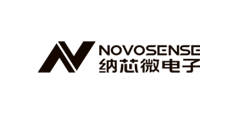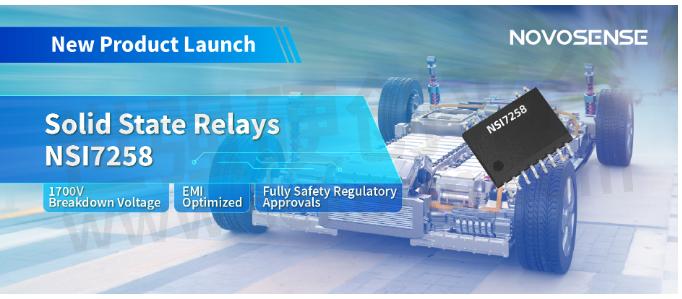NOVOSENSE Introduces New Solid State Relays NSI7258 Series Supporting 1700V Withstand Voltages and Meeting CISPR25 Class 5 Requirements

Building on its long history in isolation technology, NOVOSENSE today announced the launch of its new NSI7258 series of capacitive isolation-based Solid State Relays, available in both industrial and automotive grades. Designed specifically for high-voltage measurement and insulation monitoring, NSI7258 provides industry-leading voltage withstand capability and EMI performance to help improve the reliability and stability of high-voltage systems such as industrial BMS, PV, energy storage, charging piles, and BMS and OBCs for new energy vehicles.

Integrated SiC MOSFETs, Supporting 1700V Withstand Voltages
High-voltage systems are becoming increasingly prevalent in both the industrial and automotive sectors. In order to match the trend of high-voltage industrial and automotive platforms, NSI7258 integrates two SiC MOSFETs developed with NOVOSENSE's participation in a back-to-back format, each supporting up to 1700V withstand voltages; in the standard 1-minute avalanche test, NSI7258 withstands an avalanche voltage of 2100V and an avalanche current of 1mA, achieving industry-leading voltage and avalanche resistance. At the same time, under the test conditions of 1000V high voltage and 125℃ high temperature, the leakage current of NSI7258 can be controlled within 1μA, which greatly improves the insulation impedance and detection accuracy of the battery pack in the BMS and enables safer human-machine interaction.
Compliance with Various Safety Requirements, Reducing System Verification Time
The popularity of high-voltage applications requires compliance with various stringent safety requirements. With NOVOSENSE's proprietary technology, NSI7258 achieves industry-leading creepage distance of 5.91mm on the secondary side and 8mm on the primary side in a SOW12 package, which meets the requirements of IEC60649 formulated by the International Electrotechnical Commission (IEC). In addition, with NOVOSENSE's superior capacitive isolation technology, NSI7258's voltage withstand capability is up to 5kVrms, which fully meets the relevant UL, CQC, and VDE certifications, reducing customers' system verification time and accelerating the product-to-market process.
Significant EMI Optimization, Accelerating Optocoupler Relay Replacement
Traditional optocoupler relay solutions suffer from light decay problems and their performance degrades over time, but the advantage of optocoupler relays is that they have no EMI problems, which is one of the important factors limiting optocoupler replacement in high-voltage systems. NOVOSENSE's NSI7258 is cleverly designed to achieve industry-leading EMI performance, easily passing the CISPR25 Class 5 test without magnetic beads on the single board and leaving sufficient margin in the full-band test. NSI7258 is produced based on an all-semiconductor process for higher reliability in long-term use. Superior EMI performance and increased reliability allow customers to use multiple devices in the system at the same time without being affected, significantly reducing design difficulty and enabling customers to accelerate optocoupler replacement in system designs.
Packages and Options
NSI7258 is available in SOW12 package and is compatible with mainstream optocoupler relays in the market. The industrial version of NSI7258 will be mass-produced in the near future. The automotive version of NSI7258-Q1 meets AEC-Q100, Grade 1 requirements, supports a wide operating temperature range of -40℃ to 125℃. Samples of NSI7258 and NSI7258-Q1 are now available.
- +1 Like
- Add to Favorites
Recommend
- NOVOSENSE Has Launched Multiple Automobile-qualified Chips with Breakthrough Innovation Technology In the first half of 2022!
- NOVOSENSE Assists the Formulation of LIN Transceiver Chip Standard, Promoting the High-quality Development of the Automotive Chip Industry
- NOVOSENSE Won VDE Premium Quality Award for High Quality Development
- NOVOSENSE Released a New 1200V Series SiC Diode with Typical Fowrard Voltage of 1.39V, Contributing to the SiC Ecosystem
- NOVOSENSE NST1002 Temperature Sensor Facilitates Accurate CGM Measurement with Glucose Monitoring Black Technology
- NOVOSENSE‘s New Isolation Voltage Sampling Chips NSI1312x Series Support +1.2V Bidirectional Linear Input Voltage
- Novosense Selects Tower Semiconductor for Volume Manufacturing of their Magnetic Sensor for the Automotive On-board Charger Market
- NOVOSENSE Automotive-qualified CAN Interface Chip Boosts Smart Control of Vehicle
This document is provided by Sekorm Platform for VIP exclusive service. The copyright is owned by Sekorm. Without authorization, any medias, websites or individual are not allowed to reprint. When authorizing the reprint, the link of www.sekorm.com must be indicated.






























































































































































































































































































































































































































































































































































































































































































































































































































































































